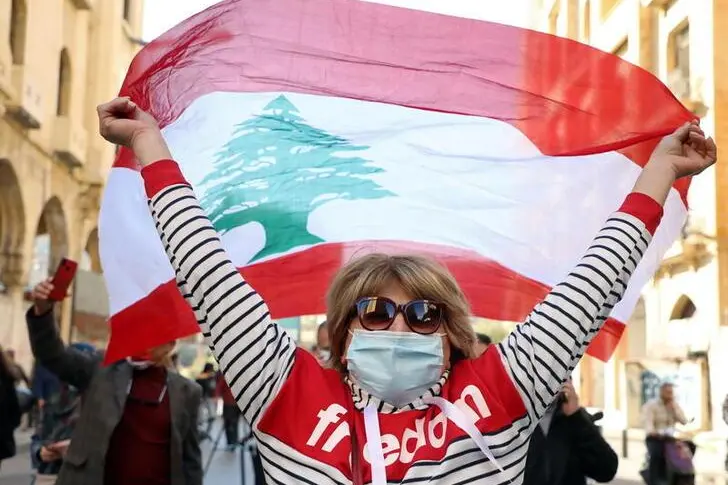PHOTO
Lebanon’s president, prime minister and parliament speaker on Thursday succeeded in putting together another scheme covered and polished by Lebanese law. President Michel Aoun has agreed to open an exceptional parliamentary session. This will effectively protect the politicians from being summoned by Judge Tarek Bitar to appear before the Beirut blast investigation.
The quid pro quo is that the politicians will be shielded from any questioning in return for Amal and Hezbollah removing their block on the government’s workflow. Hence, the Council of Ministers will be able to convene and decide on the budget, as well as to proceed with a plan to hold talks with the International Monetary Fund.
However, skeptics argue that the exceptional session could also be used to cancel the elections that are scheduled for May. Lawmakers could put on the table a measure to restrict the expatriate vote to just six seats. This would basically neutralize the expatriate vote, which is vehemently against Aoun’s Free Patriotic Movement and Hezbollah. Such a law would undoubtedly create unrest — and unrest would be the perfect excuse to cancel the elections altogether.
Some see the elections as a golden opportunity for the “sulta” (people in power) to renew their legitimacy in front of the Lebanese people and, most importantly, the international community. Polls show that the protest groups can expect to win 23 seats out of 128, meaning the elections will not uproot the ruling class. This is especially true for Hezbollah, despite the general discontent, as the group still has a grip over the Shiite faction.
Nevertheless, the elections, though they will not bring drastic change, will alter the majority — this is a threat to Hezbollah. In order to understand this threat, we need to examine why Hezbollah is in the government in the first place. Prior to the 2005 assassination of Rafik Hariri, Hezbollah was not involved in any government. It did not need to be because the Syrian regime was protecting the group and its arms. This changed with the death of Hariri and the subsequent massive protests that led to the expulsion of Syrian forces from Lebanon. Hezbollah’s guarantor was no longer there, so it needed to take control of the government to make sure it would not be subjected to any pressure that might lead to it being disarmed or delegitimized.
Following the death of his father, the Lebanese were sympathetic to Saad Hariri. The anti-Syria and anti-Hezbollah camp, under the name of the March 14 Alliance, subsequently won a parliamentary majority. Hezbollah was very uncomfortable with this result. Toward the end of 2006, Hezbollah, along with Amal, Suleiman Frangieh’s Al-Marada and the Free Patriotic Movement, orchestrated protests aimed at toppling the premiership of Fouad Siniora. They set up tents to encircle the government’s headquarters in downtown Beirut. The main point of contention was the control of the government. Hezbollah asked for a “guaranteeing” third of ministerial votes, which was in fact a blocking third. It wanted to have the right to veto government decisions, particularly any measure that came close to threatening its right to keep its arms.
If we go back in time, we see that the Israelis left Lebanon unilaterally in 2000. Since then, many questions have been raised over the arms of Hezbollah and its privilege of having weapons while other factions do not. When the civil war was ended by the Taif Agreement in 1989, the militias were asked to surrender their arms. An exception was made for Hezbollah because the group was fighting the Israeli occupation. However, this excuse faltered after the Israeli withdrawal.
In May 2008, when the government decided to end Hezbollah’s control of the communication network and fire an officer in airport security who was loyal to the group, all hell broke loose, with Hezbollah taking to the streets and using its arms against its political opponents. The attack by Hezbollah was ended by the Doha Agreement, under which Hezbollah got what it wanted: A blocking third.
While opponents of Hezbollah look at the events of May 7, 2008, as an assault on the state, the group looks at it as a necessary action to secure its survival. The uncovering of its communication network could have endangered all of Hezbollah’s leaders. These events show the extremes to which the group is willing to go to keep its control over the government. For Hezbollah, it is more than an issue of two or three ministers, it is a matter of survival.
While the forecasts do not show a drastic change in the make-up of parliament, the US, Europe and the Arab Gulf states are banking on a change in the majority, with Samir Geagea gaining popularity over his Christian opponent Aoun to weaken Hezbollah. According to Lebanese law, as in any democracy in the world, the majority chooses the prime minister and confirms the Cabinet — a Cabinet that might be hostile to the resistance axis.
What if the new government deems that Hezbollah’s interventions in Syria and Yemen are illegitimate? What if it changed the speaker of the parliament? Can Hezbollah do without long-term ally Nabih Berri, the head of Amal? In a nutshell, the elections will bring about too many unknowns that Hezbollah is better off avoiding.
- Dr. Dania Koleilat Khatib is a specialist in US-Arab relations with a focus on lobbying. She is co-founder of the Research Center for Cooperation and Peace Building, a Lebanese nongovernmental organization focused on Track II. She is also an affiliate scholar with the Issam Fares Institute for Public Policy and International Affairs at the American University of Beirut.
Copyright: Arab News © 2022 All rights reserved. Provided by SyndiGate Media Inc. (Syndigate.info).





















